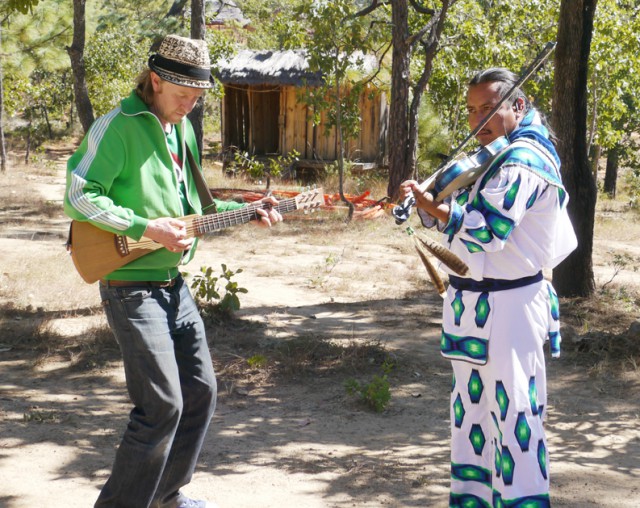
Talking on the phone with longtime record producer-turned-filmmaker Duncan Bridgeman, you get the feeling you’re talking to an extremely friendly, hippie version of Hunter S. Thompson.
His third film, Hecho en Mexico, which is screening as part of the Americas Latino Festival on Saturday, Nov. 16, at the McNichols Civic Center Building (144 W. Colfax Ave., Denver) and on Sunday, Nov. 17, at the Boulder Public Library at 6:30 p.m. (1001 Arapahoe Ave., Boulder), is a documentary unlike any other. It joyously explores and celebrates Mexican culture through song and frantic, colorful editing, and it presents a picture of an embattled country that is the exact opposite of how much of the mainstream media portrays it.
“The idea really was to reflect a different side of Mexico than the parts the media likes to latch onto, which is that Mexico is hell,” Bridgeman says. “And there are parts of Mexico that are hell, of course, but most of it isn’t. Most of it is full of beautiful, generous people who make music and talk, just like everyone else on the planet.”
Bridgeman is new to the filmmaking world. He spent most of his career as a record producer and musician, recording pop albums — for people like Paul McCartney — and composing music for soundtracks and commercials. But then he had an awakening, getting in touch with what he has described as his “inner hippie,” and began pointing his work in a different direction. He was recording world music in studios in 1999 when he realized he could start doing his job on a laptop, recording musicians around the world in their homes instead of the studio. Chris Blackwell, Bob Marley’s producer, who was funding Bridgeman’s work at the time, assented, on the condition Bridgeman make a film about his experiences. Thus, Bridgeman became a filmmaker.
1 Giant Leap, his first film, came out in 2001, and What About Me came out in 2009. His process is unlike that of most filmmakers. He’s less of a director of documentary films than a composer of them.
“I’m really making music, and having conversations with people,” Bridgeman says. “What I do is I film the conversation and the music. So when I’m editing, I’ll edit with just audio to get the sounds really beautiful and moving, and then because I have everything filmed, I start putting the pictures on and it still appears. Obviously I have to change the language a little, but I try to stick to the language of music, everything happens in 16 bars or 32 bars, it has that sort of flow to it.”
It’s a documentary written through the language of pop music. A hip-hop producer might write a beat that asks a rapper to flow for 32 bars; Bridgeman edits in scholars, poets or whoever into that same space. The result is that right when the speaker finishes or makes a profound point, the music swells and continues. It’s fascinating filmmaking, engaging and lively, giving a wondrous, idealistic view of a culture we don’t often see.
Bridgeman isn’t Mexican; he’s British. But when Mexican producer Bernardo Gomez saw his work and asked him to make a documentary on Mexico, he jumped at the chance.
“I think because of that, I could see from an outsider’s perspective and look at it on the surface and really see the beauty there, rather than the horror everyone seems to focus on,” he says.
“It’s not just about being Mexican,” he adds. “Actually, I think it’s about being human, which is why it could appeal to a wider audience.”
Bridgeman has stories upon stories from visiting Mexico, including taking peyote with the Huichol people in the hills of the Mexico countryside (“It would be rude not to,” he says). What he is searching for is wisdom, and he hopes to share what he found in Mexico with the rest of the world.
“My films celebrate the collision between ancient and modern. It celebrates the history that Mexico has. The [indigenous] culture is still alive that many countries like America and England have wiped out,” Bridgeman says. “In Mexico it just sort of became mixed in. … The whole feeling of being a Mexican, rather than being a citizen of the modern world, is very strong. And that’s what [the film is] a celebration of. It’s a celebration of maybe the wisdom of the past is the wisdom of the future. If we reconnect from the wisdom of the past, it’s got a lot of lessons for us.”
For a complete schedule of speakers, films, events and everything else at the Americas Latino Festival, visit www.americaslatinofestival.com.
Respond: [email protected]














